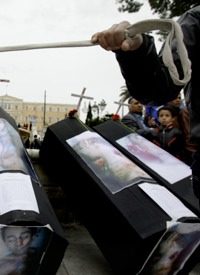
The anti-Christian violence in Egypt which immediately preceded (or was the first wave of) the current unrest tearing apart the Mubarak regime was by no means an isolated phenomena. The savage attacks on the homes of Christians in Iraq at Christmas time, as well as the violence which marred the observance of that holy season in Nigeria and the Philippines, were but the latest events in a pattern of anti-Christian violence which has been a recurrent aspect of Islam since Mohammed initiated the Jihad over 1,300 years ago.
Despite this consistent pattern of behavior, Western political elites have sought to ignore the obvious; both the Bush and Obama administrations have attempted to blame “extremists” and appealed to the supremacy of a mythical, moderate Islam; as Rev. Elijah Abraham, a former Muslim who grew up in the Middle East, explained several months ago in an interview for The New American:
There is no such thing as “moderate Islam.” You mentioned “moderate Muslim” and you need to define what a “moderate Muslim” is. But let’s go back to “moderate Islam”: There is no such thing. Islam is locked on a seventh-century Arabian religion.
Let me redefine Islam: Islam is not really even a religion. That’s a key point. It’s a socio-political system that uses a deity to advance its agenda.
Now, as the European Union weighs finally issuing a statement on the wave of persecution which Islam’s adherents have unleashed around the globe, Italian Foreign Minister Franco Frattini is insisting that the EU identify those who have perpetrated such crimes. An article for ANSA.it entitled “Failing Christians is damaging EU credibility, says Italy” explains:
Frattini had been pushing for the EU to make pledges for concrete steps for Christian minorities at a foreign ministers' meeting in Brussels Monday following a spate of deadly attacks in different parts of the world. Instead, the meeting did not even produce a joint statement, as Italy had a draft withdrawn because it condemned religious intolerance and violence in general without specifically mentioning Christians.
''I thought Europe would not have been credible if it had presented a text on violence against minorities in which the word 'Christians' is not even mentioned once,'' Frattini said. ''I proposed that the statement be withdrawn. Europe has once again shown an excess of secularism that is certainly damaging for its credibility.''
In fact, Frattini has been urging Europeans to take a decisive stand against such persecution since the eruption of violence during the Christmas season. He stressed that it was only reasonable that at the very least Europeans should cease providing financial aid to those states where persecution was allowed to thrive. Frattini worked with his French, Polish, and Hungarian counterparts in early January to urge Catherine Ashton, the EU foreign chief, to consider taking decisive diplomatic action, as reported at LifeinItaly.com:
Frattini, Michele Alliot-Marie of France, Radoslaw Sikorski of Poland and Hungary's Janos Martonyi said "concrete measures" should be considered by foreign ministers on January 31 to protect communities and promote the freedom of religious expression.
"The EU cannot be indifferent to what has happened in recent months," they said, referring to a series of attacks in the Middle East that culminated in a New Year's church bombing in Alexandria, Egypt that killed 23 Copts…. After the Alexandria bombing, Frattini said EU aid should be tied to respect for human rights in countries where Christian minorities are under attack.
Aid "should be reduced if not eliminated" for "those countries that do not collaborate" in protecting Christians, he said. "We have to move from monitoring to action," said the foreign minister, stressing that Italy could not remain "isolated" in the battle for Christians' rights around the world.
While the United States copes with a President who cannot even muster the integrity to denounce Jihadism, Frattini is unwilling to allow the victims of those Jihadists to remain nameless. The “excess of secularism” (which often is a mask for those who are animated by an anti-Christian mentality themselves, albeit usually of a less-violent streak) to which Frattini directs his anger has led the European Union to a certain unwillingness even to acknowledge that the legal, historic, and cultural roots of its member nations are grounded in those centuries when Christendom was a living reality in the daily lives of the Germans, French, English, Italians, and others who are now expected to blandly refer to themselves as “Europeans.”
The philosophical and ethical sterility of secularism has left Europe with a seeming inability to distinguish right from wrong in a manner consistent with the long history of the peoples of Europe. An unwillingness to recognize that the crime which the EU ought to be denouncing is a campaign of violence undertaken by the adherents of Islam against those who confess the Christian faith is sad testimony to the condition of the descendants of those who fought beside Charles Martel at Tours in 732, who bled on the battlefield of Kosovo Polje in 1389, or who defended Europe at the gates of Vienna in 1529 and 1683.
Photo: AP Images



